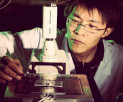‘Much about bursary plan remains vague’
Rector magnificus Elmer Sterken was bombarded with questions on Thursday about the RUG’s plans to take on 850 PhD. students over the course of eight years.
How will the PhD. students be distributed across the faculties? Will more staff be hired? Will the experiment be evaluated? What is the status of secondary social benefits? And what is the difference between PhD. students and traditional PhD. candidates?
The Staff Faction and the student faction Lijst Calimero want more specifics about how the RUG will implement the experiment, which was developed by minister Bussemaker and will compensate PhD. candidates with a grant rather than a salary for eight years.
Workload
The workload that the experiment seems likely to create is cause for concern for the Staff Faction in particular. ‘You cannot just take on 850 students and simply hope that the current system can handle it’, says faction member Rieza Aprianto.
Sterken doesn’t deny that the workload will increase. ‘But if you count the total number of professors and the number of PhD. students, there is still room for supervision’, he says. And if it turns out that more money is needed to provide for the PhD. students, the faculties will have to cover that themselves, according to the rector.
Lou de Leij, dean of the Groningen Graduate Schools and the person behind the RUG’s plans, doesn’t foresee any problems. ‘The extra number of PhD. students is roughly 20 per cent higher than the current numbers because the intake will be spread out through several years. So that isn’t so bad’, De Leij says. ‘The faculties can absorb that. We asked about that specifically during our inventory of the wishes of the faculties. We will also be intensifying the guidance provided by the Graduate Schools, and more money has been set aside to that end.’
‘Little difference’
The difference between a PhD. student and a traditional PhD. candidate is that the student will choose his or her own research topic. But that is where the differences end, according to Sterken. ‘In practice, there will be little to distinguish how a promoter interacts with a PhD. student and how they interact with a PhD. candidate in our employ. In the end, the goal is to successfully supervise someone writing a thesis, so I think that there will be little difference.’
‘That reinforces the necessity of the question of what difference it will make for a student if he or she is a PhD. student or a PhD. candidate working for the university’, says Nadine van Merode of Lijst Calimero. ‘We feel that much remains uncertain about the extent to which this system will be beneficial to the students. More opportunities to achieve a PhD. will be made available, and that is certainly a positive thing, but if that means that these positions will not offer the same level of quality that they once did, then it can’t really be considered beneficial.’
Next week, the University Council will be asked to vote on the plan. ‘But what about matters like maternity leave and healthcare costs?’, Aprianto asks. ‘That is still a point of discussion with the tax services’, Sterken concedes.
Support
Lijst Calimero also wondered how well informed the faculties were about the plans. ‘We have no idea if there is an equal level of support in each faculty. When we looked into it, we heard that some faculty councils have already voted on the plans whereas others knew little about them.’
But that is also something that will be left up to the faculties, Sterken says. ‘Every faculty board has to decide for themselves how to handle co-determination.’
The success of the experiment will be closely monitored, according to Education and Students director Luut Kroes. ‘We will make a progress report each year, and we will share that with the faculty councils and the University Council. But really, we don’t need an experiment, because we already know what works and what doesn’t.’
PhD. student positions per faculty:
1. UMCG/Medical Sciences: 300 PhD. students and 120 sandwich positions (where the students will spend two years in Groningen conducting research and two years at another university).
2. KVI-CART: 9 PhD. students.
3. Mathematics and Natural Sciences: 103 PhD. students.
4. Economics and Business: 15 PhD. students initially with the possibility to add up to 45 positions.
5. Behavioural and Social Sciences: 30 PhD. students.
6. Law: 27 PhD. students.
7. Arts: 33 PhD. students and 6 sandwich positions.
8. Theology and Religious Studies: 9 regular PhD. students and 3 sandwich positions.
9. Spatial Sciences: 12 PhD. students and 2 sandwich positions.
10. Philosophy: 12 PhD. students.
11. RUG/Campus Fryslân: 30 PhD. students.






